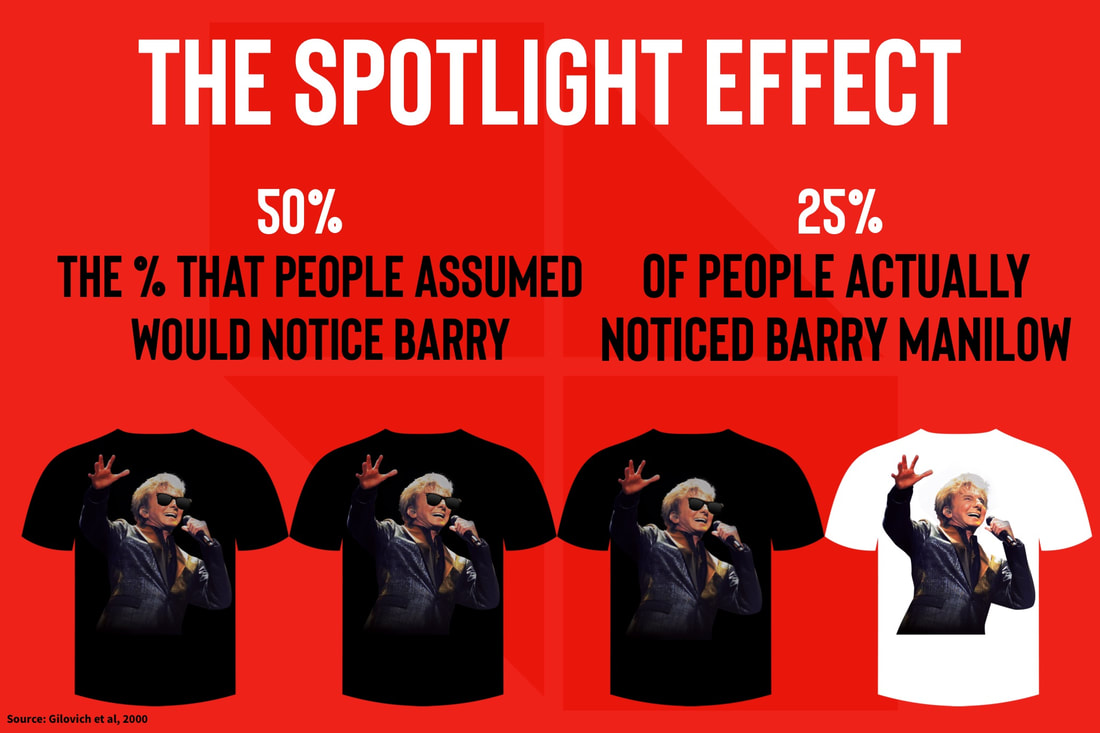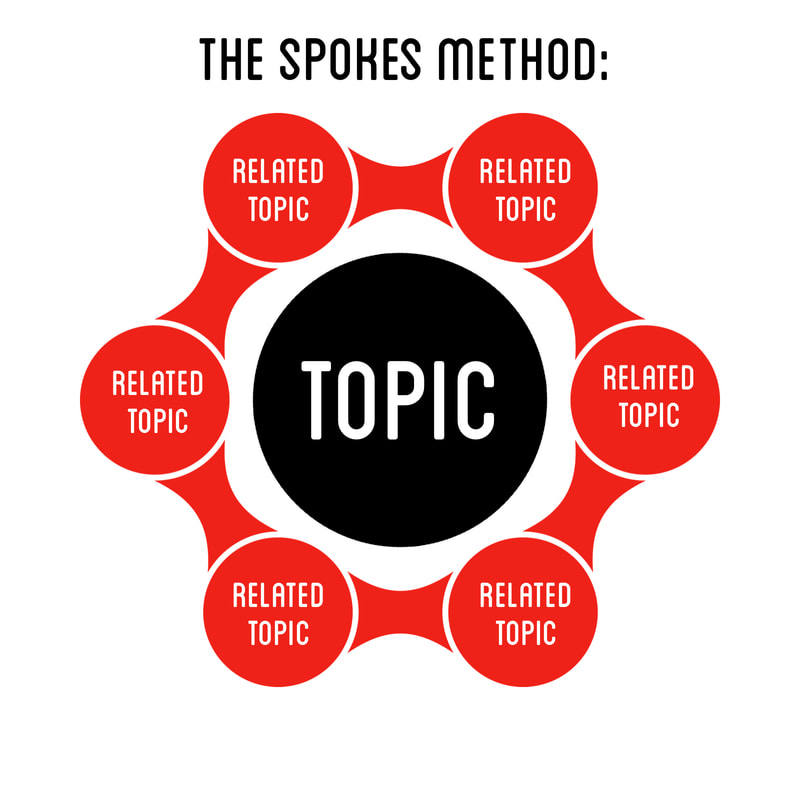
How to never run out of things to say...ah, this may be the holy grail of people skills...
If you've ever had your mind spontaneously go blank in the middle of a conversation, then you know this feeling...
Searching your mind for something...anything to say.
Yet, the harder you try to come up with something, the less you have to say.
Then the awkward silence creeps in...you might think to yourself:
"Why does my mind go blank all the time?!"
That overthinking vortex sucks.
I'm here to help.
That overthinking vortex sucks.
I'm here to help.
Recently I've received messages from people who are struggling with their minds going blank...

I have great news for you:
- It isn't because you can't think fast enough to respond.
- It's not because you were "born awkward".
- It's something you can overcome with a little planning, practice and mindset shift.
In this article, you'll learn:
- Why people aren't judging your every move in social situations.
- The Iceberg Effect: How to develop a wide range of interests so you'll have more to talk about.
- How to listen beyond people's words.
- The Quick Scan: How to always have something to talk about
- The Spokes Method: How to think "around the topic" to never run out of things to say.
- The Quick Win: How to stop socially hesitating.
After reading this article, you'll be able to make conversation with the best of 'em.
Let's dive in...
1. Realize That People Aren't Judging You.
There's this jerk of a cognitive bias called the spotlight effect.
We tend to place more importance on ourselves in any given social situation. And we tend to overestimate the amount that other people notice us.
In a 2000 study on The Spotlight Effect, researcher Tom Gilovich and his colleagues found that college students overestimated the percentage of people who noticed the Barry Manilow shirt they were wearing.
The Manilow-clad students estimated that 50% of people would notice their shirt.
In reality, only 25% of people noticed Barry.
What can we learn from this?
If you have a social slip up, it's not as big of a deal as your mind makes it out to be.
This is empowering, knowing that everyone has at least a little bit of The Spotlight Effect helps to normalize those feelings of "Oh crap, everyone is noticing me."

2. Develop A Wide Range Of Interests So That You Can Connect With People - The Iceberg Effect
Let's talk about icebergs.
Icebergs have a tip that sits above water, and much more that hides below the surface.
Iceberg tip: People who seem to seamlessly slide into any conversation and offer an opinion or comment?
Below the surface: They likely listen to a wide variety of audiobooks, podcasts, and read a few interesting articles per day.
I explain more in this video:
Real talk.
If you spend 99% of your free time learning about Power Rangers, you won't be very balanced when it comes to interests.
You'll be at a disadvantage during those pesky conversation outside of Comic-Con.
What we want is interest diversification.
Off the top of my head, here are 10 interests that I could speak to right now:
- Jazz music
- History
- Swing Dancing
- Podcasting
- Marketing Strategy
- Video production
- Writing tactics
- Iceland geology
- Theodore Roosevelt's early years
- Working out
I know, I know, you're super impressed.
Try to not be blinded by my genius.
Here's the deal...
You don't have to know a TON about any given topic, just have a well-rounded set of interests. This helps you relate to a wide variety of people.
(This is also the secret sauce that makes people seem "interesting")
Action step: Learn about one new thing today. (Use podcasts, audiobooks, Youtube, Wikipedia, some graffiti under a bridge somewhere)
Note: If you don't know much about the current topic, be curious! Let the other person teach you something new!
My podcast guest Paul Sanders and I talked about developing a wide range of interests on this episode of Become More Compelling Radio:
3. Listen Beyond Their Words
Consider the following statement:
"I'm going to work tomorrow."
Imagine it being said by these two people:
Person 1: This person has been on vacation for 1 week.
Person 2: This person just got hired after being out of work for two months.
"I'm going to work tomorrow."
Same words, but different feelings behind them.
It's important to keep an ear peaked for the feeling behind what people say.
This can clue you in on the best way to respond.
To person 1: "Guess you'll have a mountain of email to catch up on, huh?"
To person 2: "It must feel great to find a job that fits you after the last few months, huh?"
In each case, we're responding to their feelings about work. We're crafting "empathic statements" that speak to our audience's deeper emotions and feelings. This is a great way to rapidly build rapport with anyone.
For further reading on "empathic statements" read "The Like Switch" by Jack Schafer.
Most people will always have some subtext just below the surface of the words that come out of their mouths.
If you can key into that subtext, then you'll set yourself apart from everyone else they've talked to that day.
Action step: The next conversation you're in, try to assign a feeling to what the other person is saying and speak to it.
- Are they gleeful?
- Are they anxious?
- Are they grateful?
Then, try making an observation about that feeling to them.
Example: "Wow, you must be pretty pumped about that promotion!"
Check out how my client Doug improved his people skills with private coaching:
Next: A little prep goes a long way...
4. The Quick Scan: Always Have Topics To Talk About
Before you head out the door, scan trending news topics. (Twitter, Facebook, Medium, Reddit, etc.) for 1-3 interesting articles.
Choose articles that are light and good for casual conversation.
For each article, think of a simple script you could use to bring this up in conversation.
"So I saw this story on Medium before I left the house..."
This gives you a safety net to introduce a new topic into a conversation.
Let's break this down with an example:
Here's an article I found on Medium just now...

This article is about switching your iPhone to greyscale so that you don't get a gigantic dopamine hit every time you unlock your phone. (Which may lead to less screen time)
If I'm talking to someone who I think might be 1% interested in tech, iPhones, mindfulness, or productivity, I could say:
"So I'm trying this experiment. I saw this story on Medium about why turning your iPhone to greyscale could mean less mindless scrolling..."
If they seem interested, I could tell them a little more about the article, or even show them how to do it on their phone to test it out.
This is just one example!
The next time you're heading out, scan for 1-3 interesting things you can bring up in conversation.
The nice thing about sites like Medium is that they have many different sections, so chances are, you can find something for any type of event:

The only hard and fast rule is: Keep the topic light. Don't lead with that awful, tragic news story you read on Yahoo's homepage.
5. The Spokes Method: Think "Around" The Current Topic So You Won't Run Out Of Things To Say
The spokes method will help you connect with anyone on virtually any topic.
Even if you don’t know much about the current topic.
No more grasping for small talk topics! Yay!
Imagine a bicycle wheel.
In the middle you have a hub, and radiating out from the hub are several spokes.
Now, imagine the hub as the conversational topic.
The spokes are different, related topics that can be introduced.
Example: Your conversational partner brings up mountain biking, something you don't know much about.
Should you just stonewall them and say "I don't want to talk about mountain biking."
NO!
Dale Carnegie, author of How To Win Friends And Influence People once spent an entire dinner party talking (and mostly listening) about botany. Something he knew little about.
His conversational partner told the host that Carnage was the best conversationalist he'd ever met.
Lesson: You don't have to carry the conversation.
Watch this video for more examples of The Spokes Method:
Do this instead: Use the Spokes Method to "think around the topic" and mention other things that are related to mountain biking:
- Tour De France
- Hiking
- Places to mountain bike
You can go deeper into who the person is by bringing up:
- "So what got you into mountain biking?"
- "Do people mountain bike race?"
- "What's the most challenging type of trail you've been on?"
You can even play the role of beginner with a question like:
- "I don't know much about mountain biking, what do you like about it?"
Using Spokes, you're able to talk with anyone about anything.
Spokes works because it's a win-win.
A win for you because you get to have a great, engaging conversation without awkward silences.
A win for them because (spoiler alert) other people love talking about themselves and will leave the conversation thinking that you are awesome.
Keep in mind that it's important to resist the urge to self-edit what you say.
If you think it's good enough for the conversation, it doesn't have to be the perfect thing to say.
Perfect is the enemy of good.

Check out this private coaching case study where I helped my client Julien become more socially confident at work:
6. Stop Hesitating. Start Focusing On The Quick Win To Build Social Confidence
With my private coaching clients and readers, the biggest challenge to overcoming the dreaded "blank mind syndrome" is hesitation.
When we hesitate, we allow our overthinking brain to take over.
This causes us to overthink (and over-edit) everything we might say:
"Oh, I can't say that!"
It causes us to minimize our own importance:
"What could I possibly add?"
And worst of all, it causes us to be stuck in our own heads. This leads to negative self talk:
"Why do I always do this?! I am so dumb."
At that point, it's really hard to break out and rejoin the conversation. I call this the "overthinking tax"
A better approach? The quick win.
When we stop overthinking and take action, we learn and grow faster:
There are many ways to quick win in a conversation:
- Introduce yourself first to any new people that join the group. Catch them up on the current topic.
- Bring up interesting items from your quick scan.
- Be curious about who they are. "So what brings you to this conference?" or "Where did you grow up?"
The surface level effect of going for the quick win is simply having a more engaging conversation.
The lasting impact of going for the quick win is building the inner belief that you are the kind of person who can be successful with people.
When we change our actions, our mindset follows.
It's hard to think ourselves to social confidence.
It's easier to do things that naturally lead to social confidence.
Our mindset will follow.
Summary: How To Never Run Out Of Things To Say
- Realize That People Aren't Judging You.
- Develop A Wide Range Of Interests So That You Can Connect With People - The Iceberg Effect
- Listen Beyond Their Words
- The Quick Scan: Always Have Topics To Talk About
- The Spokes Method: Think "Around" The Current Topic So You Won't Run Out Of Things To Say
- Stop Hesitating. Start Focusing On The Quick Win To Build Social Confidence
Next Step:
Want more tips to help you improve your people skills?
Click here and I'll send you my free 56-minute audio guide on joining and enjoying group conversations. (As well as Q&A videos, podcast, and much more)
In the audio guide, you’ll learn…
- How to jump into a conversation that has no opening
- Genuinely Connect With Anyone About Any Topic
- How To Get Out Of Your Head And Stay Present In Group Conversations
- And more (word-for-word scripts, body language while joining a group, etc)
4 ways I can help you level up your communication skills:
1. Private Coaching: I’m the secret weapon top Performers at Google, Netflix, and the US Army trust for people skills coaching. Imagine what I can do for you.
2. Social Accelerator: Social Accelerator is my proven self-paced + group coaching system for turning social awkwardness into confidence, overthinking into action, and hesitation into meaningful connections.
3. My group convos audio guide. Join over 5,000 overthinkers who have supercharged their group conversation skills using tested strategies in my 56-minute audio training.
4. My bestselling book Confidence-Maxxing. What I teach in this book comes from lessons that took me over 20 years and 100,000 conversations to learn. If you've ever felt like people skills are something you should've figured out by now but haven't, I wrote this for you.

I'm Jeff Callahan
I make it nearly impossible for overthinkers to fail at improving their people skills. (I've helped hundreds of people over the last 10 years)
Want to never run out of things to say in conversation again so you connect with more people and make new friends?
Want to speak up more in important meetings at work so you get promoted faster and have an awesome career?
Want to develop unshakeable social confidence and competence so you can walk into any room and feel like you belong there?
As your coach, I'll help you move forward faster.



















